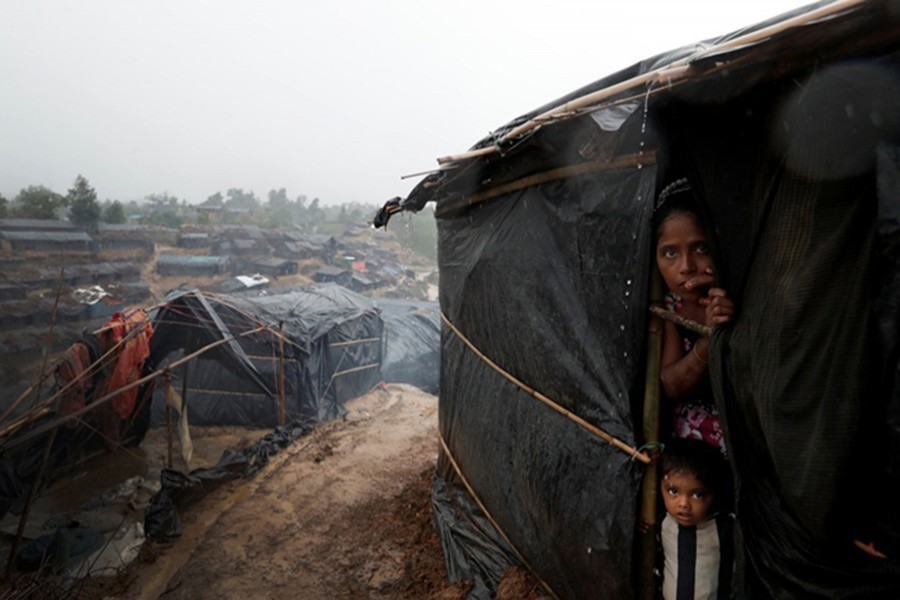The approval of foreign funds for non-governmental organisations (NGOs) in Bangladesh marked a significant rise in the last fiscal year (FY) mainly due to an increased amount of grants for Rohingya people.
According to official figures, the volume of overseas funds approved by the NGO Affairs Bureau (NGOAB) in FY 2017-18 rose by around 43 per cent compared to the previous fiscal.
NGOs operating in Bangladesh got approval for Tk 70.22 billion from international donors in the last fiscal to implement various projects including those undertaken for rehabilitation of Rohingya people.
The volume of overseas donations was Tk 49.15 billion in FY 2016-17. The figures were Tk 40.97 billion and Tk 62.15 billion in FY 2014-15 and FY 2015-16 respectively.

Sources said besides support to Rohingya, foreign aid for projects involving climate change adaptation and extreme poverty reduction in some regions contributed to the surge in funds in the last FY.
When contacted, NGOAB director Md Shahadat Hossain said NGOs working in Bangladesh had been able to manage a large amount of funds from foreign donors to deal with the Rohingya crisis.
"I think financial support for both local and international NGOs to help them tackle the Rohingya crisis is the main reason behind the surge in foreign aid," he said.
Mr Hossain also said funds are essential for Bangladesh to deal with such a situation in Cox's Bazar where Rohingya people are sheltered.
He also said the amount of foreign grants for the Bangladeshis living below the poverty line is shrinking.
"Underprivileged people of our own country still need such support," he said.
In response to a query, Mr Hossain said there is no exact figure of how much of the money was collected for the Rohingya in particular.
According to the NGOAB data, 2,625 NGOs, including 259 foreign ones, were operating in different regions of Bangladesh as of June last.
Besides poverty alleviation, NGOs are playing a crucial role in developing human resources, healthcare, education, climate change adaptation and human rights protection.
The NGOAB approved 1,625 projects in FY 2017-18 against 1,037 in the previous fiscal.
Experts believe the surge in foreign aid along with the number of projects will benefit the underprivileged in many ways.
The development activities with foreign funds would help create employment opportunities in the country, said an expert.
Deputy Managing Director (Administration) of Palli Karma-Sahayak Foundation (PKSF) Dr Md Jashim Uddin said proper use of funds would pave the way for employment generation.
On one hand, professionals are creating opportunities in the development sector, on the other hands, many people are getting employed at the grassroots level, he said.
"The more economic activities you execute, the more capacity you build for the nation," he said.
According to his estimation, apart from Rohingya issues, foreigners increased their support for projects aiming to reduce climate change impacts and alleviate poverty in some regions in the country.
"Despite a positive growth in the national economy, some regions are not getting equal benefit which is drawing donors' attention," he said.
Funds could help create direct employment and micro-entrepreneurs in rural areas including Rohingya camps, he added.
According to media reports, nearly one million Rohingya people have been given shelter in Cox's Bazar district since August last year to help flee atrocities of Myanmar army in Rakhine state.
Federation of NGOs in Bangladesh (FNB) Director Rafiqul Islam said increased funds for Rohingya people are helping the economy in Cox's Bazar in various ways.
Many NGOs opened offices in Cox's Bazar where a good number of foreign officials along with their Bangladeshi partners pay regular visit to address the Rohingya crisis, he said.
"Such activities help the tourism sector grow indirectly there," he added.
Regarding overall NGO funding, he said the allocations for most of the regions are on the wane in recent times as Bangladesh is getting familiar as a fast growing economy.
"Many NGOs are working directly with the government's support to implement projects related to achieving SDGs (sustainable development goals)," he added.


